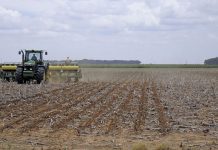
The programme, which was intended to provide much-needed support to farmers by strengthening the capacity of extension and advisory services, has been marred by confusion, lack of communication, and questions regarding budget allocation.
READ UFS to open Faculty of Veterinary Science by 2027
According to Khanyisani Mlambo, an assistant agricultural practitioner, the AAP Programme was launched in 2022.
“At first, it was introduced as a three-month contract. The ratio of extension officers to farmers was too high, so we were brought in to improve the ratio and ensure every farmer received the services they needed.”
In 2023, the programme was extended for another three months, reflecting its success and the ongoing need for such support in the agriculture sector. However, despite the apparent demand and positive impact, the contracts were unexpectedly cut short after seven months.
The termination of the AAP contracts has sparked a significant controversy, with questions being raised about the allocation and management of funds within the Department of Agriculture, Land Reform, and Rural Development (DALRRD).
According to Mlambo, the department directed AAP members to Treasury, which assured them that the funds had been allocated to the DALRRD.
“However, when we approached the department, they weren’t willing to explain what happened to the money. We feel as if we were hard done by,” Mlambo said.
READ How Limpopo co-operative’s training programmes are empowering workers
The communication breakdown between the DALRRD and Treasury has left the graduates stranded, with no clear answers regarding their future.
Nkete Tladela, the communication officer for the AAP, said: “According to the budget allocation, the funds that were supposed to be used for extension officers were used for farmer support. We tried to have a meeting with the director-general, but he has been unavailable due to being abroad.”
The DALRRD’s official stance on the issue has been one of regret, citing budget cuts as the reason for the programme’s termination.
Bonga Msomi, chief director of National Extension Support Services, said: “The department at this stage cannot sustain this additional cost due to budget cuts on the compensation of employees. However, we will continue to explore finding a solution for the practitioners.”
Despite this, the affected graduates remain in a precarious position, with no guarantees of reinstatement or alternative employment. The issue has caught the attention of Parliament, with Narend Singh, Chief Whip of the IFP, writing to President Cyril Ramaphosa to inquire about the possibility of reinstating the programme.
Singh’s letter emphasised the importance of the AAP programme in addressing food insecurity and youth unemployment.
“The gap that they were employed to fill persists in the sector, as food insecurity continues to pose a grave challenge to our nation, the information gap for rural farmers continues to widen, and unemployment continues to plague our youth,” Singh wrote.
He called on the president to honour the commitment made in the National Assembly on 19 March 2024 to support such initiatives.









